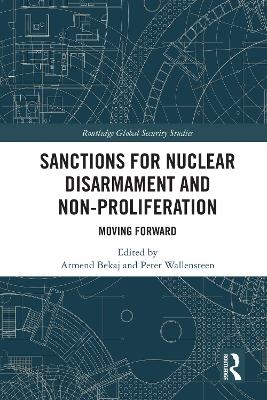
Sanctions for Nuclear Disarmament and Non-Proliferation
Routledge (Verlag)
978-1-032-68421-5 (ISBN)
The volume aims to tackle three separate but closely intertwined issues:
It aims to revisit the debate on, and deconstruct the concept of, sanctions; to provide a working theoretical framework; to differentiate between positive sanctions (or incentives or carrots) and negative sanctions; to identify the actors who may initiate sanctions (i.e. states, regional, and/or international organizations); to ascertain the legality and legitimacy of such sanctions taking place; to problematize and discuss the utility of sanctions; and so on.
It aims to disentangle the concepts of nuclear disarmament and non-proliferation, particularly in light of the most recent geopolitical global shifts on nuclear powers-interplay taking place in the background of the war in Ukraine and rising tensions in Southeast Asia, and so on.
Finally, it aims to conjoin the cause-and-effect cases between the application of sanctions, on the one hand, and the decision by states to pursue nuclear disarmament and non-proliferation, on the other. By doing so, the volume helps to update and stimulate the academic and policy debate on the inter-relation between sanctions and nuclear disarmament and non-proliferation.
This book will be of much interest to students of nuclear non-proliferation, economic sanctions, security studies, and International Relations.
Armend Bekaj is a researcher at Working Group 2 on International Measures for Compliance to Nuclear Disarmament Regimes at Alva Myrdal Centre for Nuclear Disarmament (AMC), Department of Peace and Conflict Research (DPCR), Uppsala University, Sweden. He combines academic and policy experience on peace and conflict and democracy and autocracy, with a focus on sanctions and nuclear disarmament/non-proliferation. Peter Wallensteen is Dag Hammarskjöld Professor Emeritus of Peace and Conflict Research at Uppsala University, Sweden, and Richard G. Starmann Sr. Research Professor Emeritus at Kroc Institute, University of Notre Dame, Indiana, USA. He served as the first Head of the Uppsala Department of Peace and Conflict Research and now leads AMC’s Working Group on International Measures for Compliance to Nuclear Disarmament Regimes.
Introduction. 1.The Promise of Sanctions for Disarmament and Non-Proliferation. Part I: General Observations on International Sanctions. 2.Incentivizing Non-proliferation: Theory, Policy, and Experience. 3.Sanctions as Tools to Achieve Nuclear Reduction Policy: Is there a Better Way Forward? 4.The EU’s Use of Sanctions in Nuclear Non-proliferation and Arms Control. 5.Latin America and the Caribbean: a Tradition of Nuclear Disarmament and Non-proliferation. Part II: The Use of Sanctions for Nuclear Arms Control and Non-proliferation. 6.Constrain, Coerce and Deter: Non-proliferation Sanctions against India and China. 7.Between a Rock and a Hard Place: Pakistan’s Nuclear Weapons and Sanctions. 8.The Utility of Sanctions on Non-proliferation: Iran’s Nuclear Programme. 9.Liberation Movements, Sanctions, and Nuclear Disarmament: the African National Congress and apartheid South Africa. 10.The Federal Republic of Germany and the Non-Proliferation Treaty: Did Sanctions Have an Effect? Conclusion. 11.Sanctions and Non-Proliferation: Where We Are and Where We Should Go.
| Erscheinungsdatum | 03.08.2024 |
|---|---|
| Reihe/Serie | Routledge Global Security Studies |
| Zusatzinfo | 5 Tables, black and white |
| Verlagsort | London |
| Sprache | englisch |
| Maße | 156 x 234 mm |
| Gewicht | 571 g |
| Themenwelt | Sozialwissenschaften ► Politik / Verwaltung ► Europäische / Internationale Politik |
| ISBN-10 | 1-032-68421-6 / 1032684216 |
| ISBN-13 | 978-1-032-68421-5 / 9781032684215 |
| Zustand | Neuware |
| Informationen gemäß Produktsicherheitsverordnung (GPSR) | |
| Haben Sie eine Frage zum Produkt? |
aus dem Bereich


